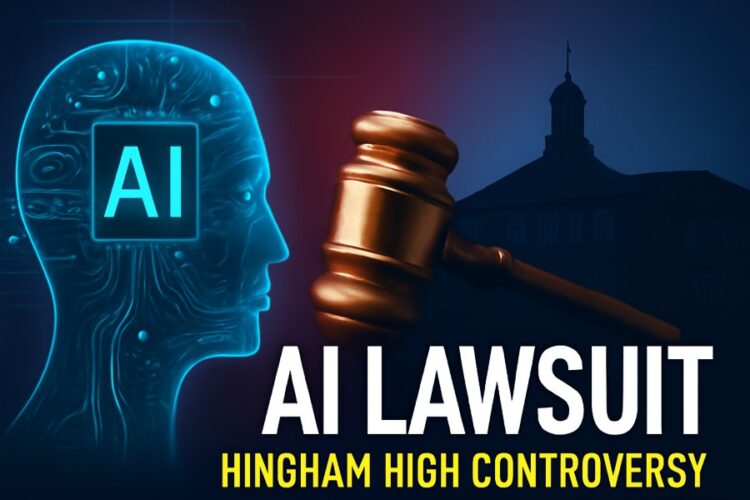In the quaint coastal town of Hingham, Massachusetts, a high school senior’s use of artificial intelligence has sparked a legal firestorm, pitting ambitious parents against a school district that strives to uphold academic integrity.
The lawsuit, initiated by a couple against Hingham High School, states that their son was wrongly disciplined because he used AI to make notes and an outline for a history project.
The case has elicited a broad spectrum of reactions, including anger, empathy, and consideration, and has also raised numerous questions about the implementation of AI in education, the boundaries of plagiarism, and the extent to which parents are willing to help their children succeed. With the advent of AI in schools, this conflict may alter the way we learn and teach in a technology-driven world.
A Project Changed for the Worse
The debacle came to light in December 2023, when a Hingham High School senior, with the help of a classmate, was assigned to work on an AP U.S. History project about Kareem Abdul-Jabbar’s civil rights activism. The students decided to proceed with creating research notes and an outline using Grammarly.com, an AI-powered writing tool. The text generated by the AI contained not only the main body but also citations for non-existent sources, for example, a book by ‘Jane Doe.’
The school identified the incident as a violation of its academic integrity policy, so it was decided to give the students a zero on the project, ask them to complete it separately with topics of their choice, and also impose a Saturday detention. The student involved ended up with a D (65/100) on his second attempt, which resulted in a decrease in his course grade to a C+, while his partner earned a score of 75. The episode furthermore resulted in the student’s first exclusion from the National Honor Society (NHS), which negatively impacted his dream of going to prestigious schools like Stanford and MIT.
It was the parents, a writer and a teacher, who stated that the son was unjustly punished. According to them, the 2023-2024 school handbook had no regulations regarding AI, so the punishment is ‘arbitrary and capricious.’ They maintain that their son, who excels in both studies and sports, with a 4.0 GPA, a perfect ACT score, and a 1520 SAT, was solely engaged in AI as a research tool and not for writing the paper. “This is a child who can do whatever he wants,” his mother said to local media, highlighting his potential to enter top universities.
Their family alleges that the low grade and record of punishment are detrimental to their college prospects, making it impossible to apply for early and rolling admissions. They argue that the grade should be corrected to B, the sanction removed, and that AI training for school staff should be mandatory, as they are the primary users of the technology and thus the content created belongs to them as intellectual property.
On the other hand, Hingham High School is very sure of itself. The district claims that, regardless of whether these rules are outlined in the school’s handbook, the rules against “unauthorized technology” and plagiarism—defined as passing off another’s work, including AI-generated content, as one’s own—are apparent and are followed. The AP English teacher, in addition to that, had also taught a lesson on academic honesty, specifically cautioning against AI-generated text copying without consent. School officials portray the punishment as lenient to the extent that the student could have easily gotten a zero or expulsion for what they see as clear-cut cheating.
A Legal Standoff with High Stakes
The lawsuit was first filed in Plymouth Superior Court in September 2024 and later moved to Boston’s federal court. It names the superintendent, administrators, social studies teachers, and the Hingham School Committee as its targets. To reverse the disciplinary measures, the family applied for a preliminary injunction, which U.S. Magistrate Judge Paul G. Levenson turned down in November 2024.
In his ruling, he said that the school” ”reasonably conclude” the student violated academic integrity by”indiscriminatel” copying AI text”” and emphasized that federal courts give school-based disciplinary decisions the benefit of the doubt unless the actions are blatantly unjust.
Although the motion for an injunction was rejected, the family’s lawyer intends to delve deeper into the case by gathering additional evidence through the discovery process.
These inconsistencies in how the regulations were enforced were brought to light by the lawsuit. According to court filings, seven other NHS inductees at Hingham High had their records of misconduct as well, one of which involved artificial intelligence, so the NHS decided to let the student submit a new application.
It questions the fairness and the school’s reaction, whether it was apportioned or discriminatory. Besides that, the parents complain of having a””Safety Pla”” implemented in theirson’ss life which indicates that the reaction was more than necessary, borderline intimidation.
Public Outcry: Entitlement or Evolution?
This controversy has gone viral online and ignited an intense debate, which has been very prominent on social media. The opinion of most people is that the student is guilty of plagiarism in the most obvious way, which is essentially hiring someone else to write their paper. They propose that education is not about outsourcing to machines, but rather about developing critical thinking skills.
“If kids can just get AI to write their papers, then school is just a waste of time,” said one of the commenters, succinctly putting across the idea of the loss of seminar in the face of the abuse of AI technology. Among many other things, they say that the parents’ lawsuit is full of entitlement, and they compare it to famous academic cheating scandals wherein the rich shielded their children from the consequences of their actions. “This is Lori Loughlin USC scandal levels of parent fuckery”” said one of the commenters satirically, making the point that parents are more interested in helping their children cheat rather than teaching them to do the right thing.
The family’s tactics have come under scrutiny due to the publicity surrounding the suit. Many take the Streisand Effect into account, and they say that the choir performance that the controversy has made of the son’s cheating is more likely to damage his college prospects than any C grade would have been.””Colleges like Stanford are not going to be happy with a student who uses AI to write his work instead of doing it by himself,” said one of the commentators,” a nd they are going to be aware of it right now,” Considering that disciplinary offenses are over. Elite universities are refusing applicants. The conjecture about the downside of the lawsuit is that it could be better known in different admissions offices, thus causing the student to be perceived as a cheater.
However, some voices present a more nuanced perspective. They claim that AI, similar to calculators years ago, is a perfect tool that schools have to assimilate into their teaching curriculum rather than prohibit its use.”AI has come to stay, and those who use it as a help, not as a way out, will be the winners”” a comment stated, suggesting that the ethical use of AI be taught, as the ai role in the creative process or the text revising, instead of punishment, be the result of its presence. The issue at hand reflects broader contradiction: the question of how to reconcile academic honesty with the fact that AI is radically changing the world of work, where the use of tools like Grammarly and ChatGPT is not only accepted but also encouraged
The AI Dilemma in Education
What happened in Hingham highlights a significant issue in education regarding the use of AI: the absence of a clearly defined policy related to AI. According to a 2023 survey conducted by Study.com, 26% of teachers in K-12 schools reported having caught students using AI to cheat. Nevertheless, most schools, including Hingham in 2023, were without clear guidelines on the matter. Massachusetts is one of the 35 states that have no clearly defined AI-related policies for schools at the state level; therefore, AI districts must deal with this issue of unmarked territory on their own.
Hingham High explicitly dealt with AI in the recently revised 2024-2025 handbook. However, the experts have warned that a school with unclear or fluctuating rules is likely to cause discomfort.”Without clear definitions of how AI is to be used as a help in research, schools risk running into trouble legally and also receiving adverse reactions from the public”, said the legal expert, urging for the adoption of uniform policies that differentiate between research aids and plagiarism.
Another problem that educators must grapple with is the fact that artificial intelligence tools for detecting deception are not entirely reliable. The software currently used to distinguish between human- and AI-generated text is not very efficient. We have a comment stating,””It is quite simple to prepare a model in such a way that its output is recognized as human text”” False positives could result in the wrongly accused of misconduct,. False negatives could give cheaters a free pass. As a result, teachers have resorted to methods such as in-class writing, oral exams, and multi-stage assignments, including annotated bibliographies and outlines, to prevent cheating.”The purpose is not to write a paper”, as one educat or put it,” but to make a display of the critical thinking and knowledge that is the research base of the topic under study.”
At the same time, the case is pushing’he teachers” issues forward, who believe they are being held back by the parents of the kids, who are embracing technological changes too quickly.”Parentss who are constantly protecting their offspring from the consequences of their actions are the biggest obstacles in the way of education”, a former teacher said, reflecting the mood of staff members who are not only involved in grading disputes but also sued. Due to the lack of teachers, the problem has been exacerbated. Therefore, new educators may be less confident in facing parents, which makes the enforcement of academic standards more difficult.
A Fork in the Road for Education
This wise Hingham student risks high personal stakes. Suing the school along with him, he would be one of the prime candidates for Ivy League schools such as Stanford. A C+, a maybe on the honor roll scale, and disciplinary notes could easily be the cause for turning down applications in the 3.9% acceptance rate. On the other hand, this lawsuit may bring him to the attention of admissions officers who will read about the event and are less likely to be impressed. His parents insist he is a scapegoat of an archaic system that is somehow AI-illiterate. At the same time, activists assert that his conduct (crafting AI-based text with fake references) is nothing but hypocrisy against the world’s leading universities.
This case is a sign that things are about to change beyond the limits of Hingham. No matter how schools choose to approach AI – whether by using it for research and writing, or by sticking to traditional tests that measure genuine knowledge – they will have to adapt eventually. Dan Wang from Columbia Business School is one of the people who believe that AI should be introduced in the education system. He predicts that AI-powered offices will dominate the future, and those who know how to utilize the technology will be the most employable. The others, however, contend that the absence of clearly defined rules may lead to the complete disappearance of the critical thinking skills that education aims to develop.
If this legal case keeps going, it has the potential to have a significant impact on a variety of issues, such as how educational institutions use AI, the management of staff by giving a fair balance between innovation and discipline, and parental relations in a time where technology is changing rapidly. Anyway, the Hingham High School AI lawsuit remains a reminder of the risks: the intersection of determination, technology, and responsibility with a student’s fate—and education’s—still uncertain.










